Global Politics: Transnational Civil Society, Diaspora, EU Impact
VerifiedAdded on 2021/06/15
|16
|4204
|172
Report
AI Summary
This report delves into key aspects of global politics, examining the roles of Transnational Civil Society (TSC) and advocacy politics, the concept of diaspora, and the constitutive influence of European Union (EU) institutions on member states. The first section explores how TSCs, like Amnesty International, leverage expertise, legitimacy, and moral authority to influence global agendas, norms, and policies. It highlights their methods, from agenda-setting to coalition-building and norm implementation. The second section provides an overview of the term 'diaspora,' tracing its evolution from its initial use to its broader application to diverse migration groups. It discusses various definitions and typologies, including the importance of homeland orientation, and the complexities of home and identity in the context of globalization. The final section analyzes the impact of EU institutions on member states' domestic processes, emphasizing the concept of Europeanization and how EU policies, politics, and polity affect domestic structures. It also discusses the factors determining the degree of pressure for adaptation within member states, and the role of the European judicial system.
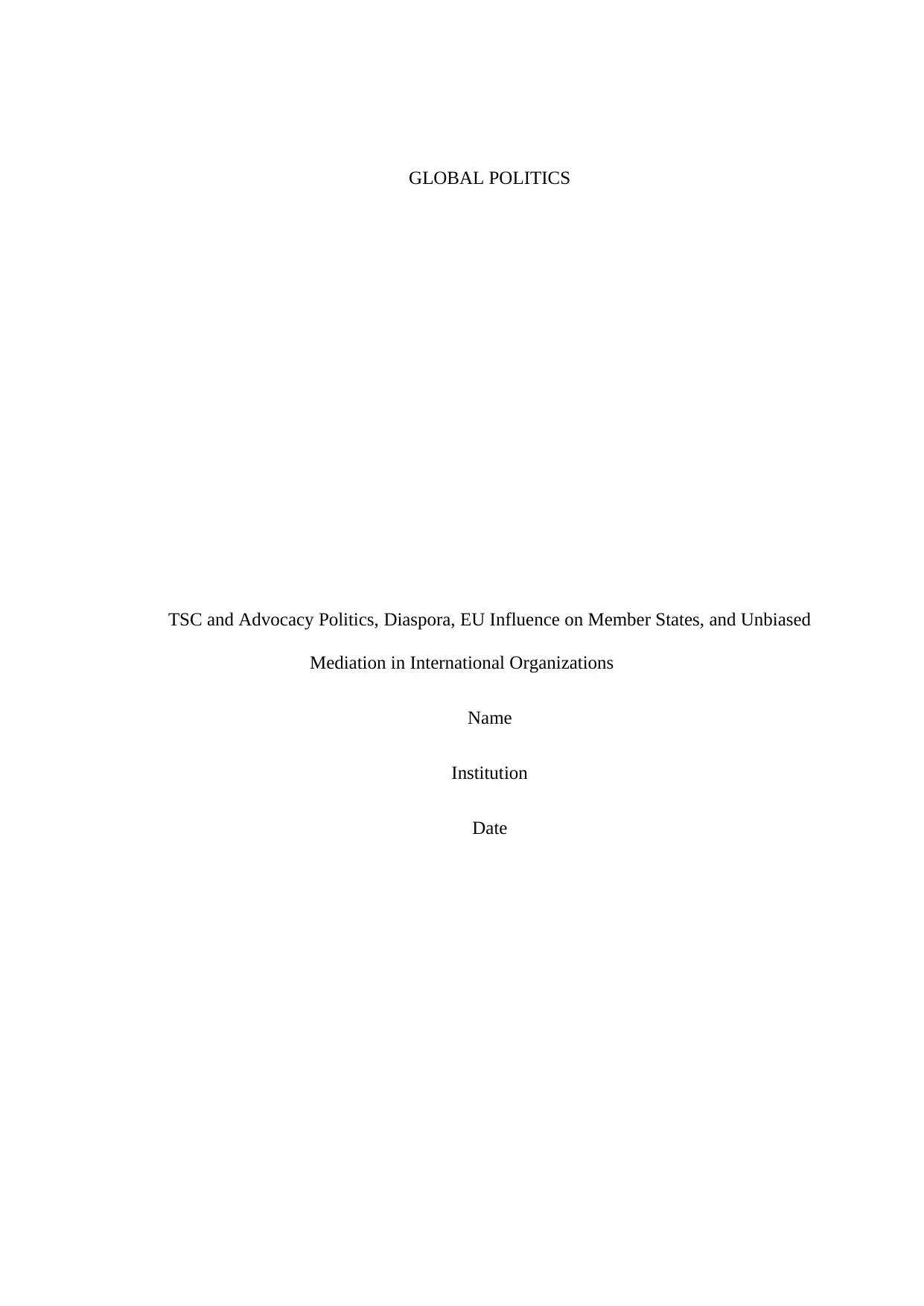
GLOBAL POLITICS
TSC and Advocacy Politics, Diaspora, EU Influence on Member States, and Unbiased
Mediation in International Organizations
Name
Institution
Date
TSC and Advocacy Politics, Diaspora, EU Influence on Member States, and Unbiased
Mediation in International Organizations
Name
Institution
Date
Paraphrase This Document
Need a fresh take? Get an instant paraphrase of this document with our AI Paraphraser
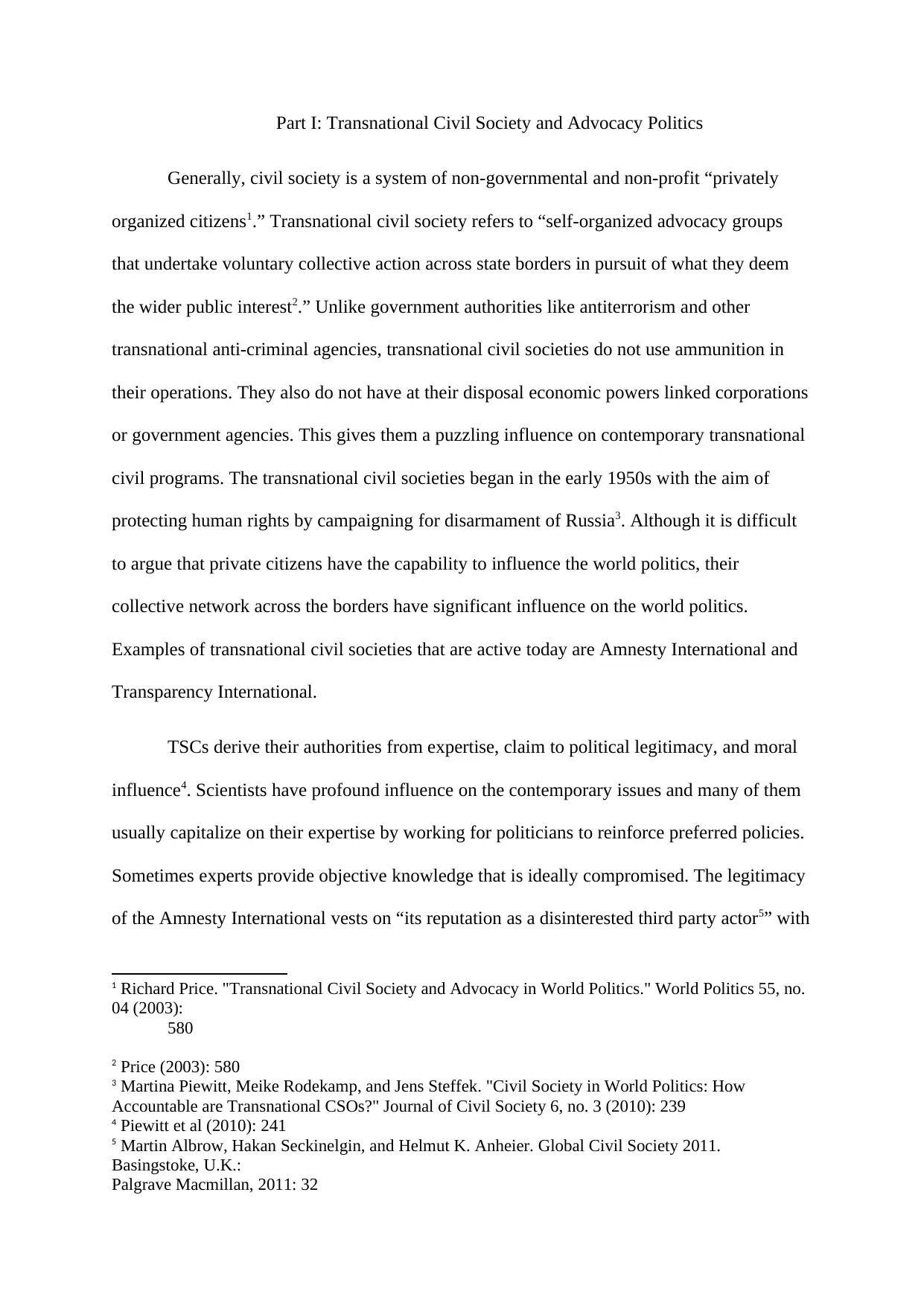
Part I: Transnational Civil Society and Advocacy Politics
Generally, civil society is a system of non-governmental and non-profit “privately
organized citizens1.” Transnational civil society refers to “self-organized advocacy groups
that undertake voluntary collective action across state borders in pursuit of what they deem
the wider public interest2.” Unlike government authorities like antiterrorism and other
transnational anti-criminal agencies, transnational civil societies do not use ammunition in
their operations. They also do not have at their disposal economic powers linked corporations
or government agencies. This gives them a puzzling influence on contemporary transnational
civil programs. The transnational civil societies began in the early 1950s with the aim of
protecting human rights by campaigning for disarmament of Russia3. Although it is difficult
to argue that private citizens have the capability to influence the world politics, their
collective network across the borders have significant influence on the world politics.
Examples of transnational civil societies that are active today are Amnesty International and
Transparency International.
TSCs derive their authorities from expertise, claim to political legitimacy, and moral
influence4. Scientists have profound influence on the contemporary issues and many of them
usually capitalize on their expertise by working for politicians to reinforce preferred policies.
Sometimes experts provide objective knowledge that is ideally compromised. The legitimacy
of the Amnesty International vests on “its reputation as a disinterested third party actor5” with
1 Richard Price. "Transnational Civil Society and Advocacy in World Politics." World Politics 55, no.
04 (2003):
580
2 Price (2003): 580
3 Martina Piewitt, Meike Rodekamp, and Jens Steffek. "Civil Society in World Politics: How
Accountable are Transnational CSOs?" Journal of Civil Society 6, no. 3 (2010): 239
4 Piewitt et al (2010): 241
5 Martin Albrow, Hakan Seckinelgin, and Helmut K. Anheier. Global Civil Society 2011.
Basingstoke, U.K.:
Palgrave Macmillan, 2011: 32
Generally, civil society is a system of non-governmental and non-profit “privately
organized citizens1.” Transnational civil society refers to “self-organized advocacy groups
that undertake voluntary collective action across state borders in pursuit of what they deem
the wider public interest2.” Unlike government authorities like antiterrorism and other
transnational anti-criminal agencies, transnational civil societies do not use ammunition in
their operations. They also do not have at their disposal economic powers linked corporations
or government agencies. This gives them a puzzling influence on contemporary transnational
civil programs. The transnational civil societies began in the early 1950s with the aim of
protecting human rights by campaigning for disarmament of Russia3. Although it is difficult
to argue that private citizens have the capability to influence the world politics, their
collective network across the borders have significant influence on the world politics.
Examples of transnational civil societies that are active today are Amnesty International and
Transparency International.
TSCs derive their authorities from expertise, claim to political legitimacy, and moral
influence4. Scientists have profound influence on the contemporary issues and many of them
usually capitalize on their expertise by working for politicians to reinforce preferred policies.
Sometimes experts provide objective knowledge that is ideally compromised. The legitimacy
of the Amnesty International vests on “its reputation as a disinterested third party actor5” with
1 Richard Price. "Transnational Civil Society and Advocacy in World Politics." World Politics 55, no.
04 (2003):
580
2 Price (2003): 580
3 Martina Piewitt, Meike Rodekamp, and Jens Steffek. "Civil Society in World Politics: How
Accountable are Transnational CSOs?" Journal of Civil Society 6, no. 3 (2010): 239
4 Piewitt et al (2010): 241
5 Martin Albrow, Hakan Seckinelgin, and Helmut K. Anheier. Global Civil Society 2011.
Basingstoke, U.K.:
Palgrave Macmillan, 2011: 32
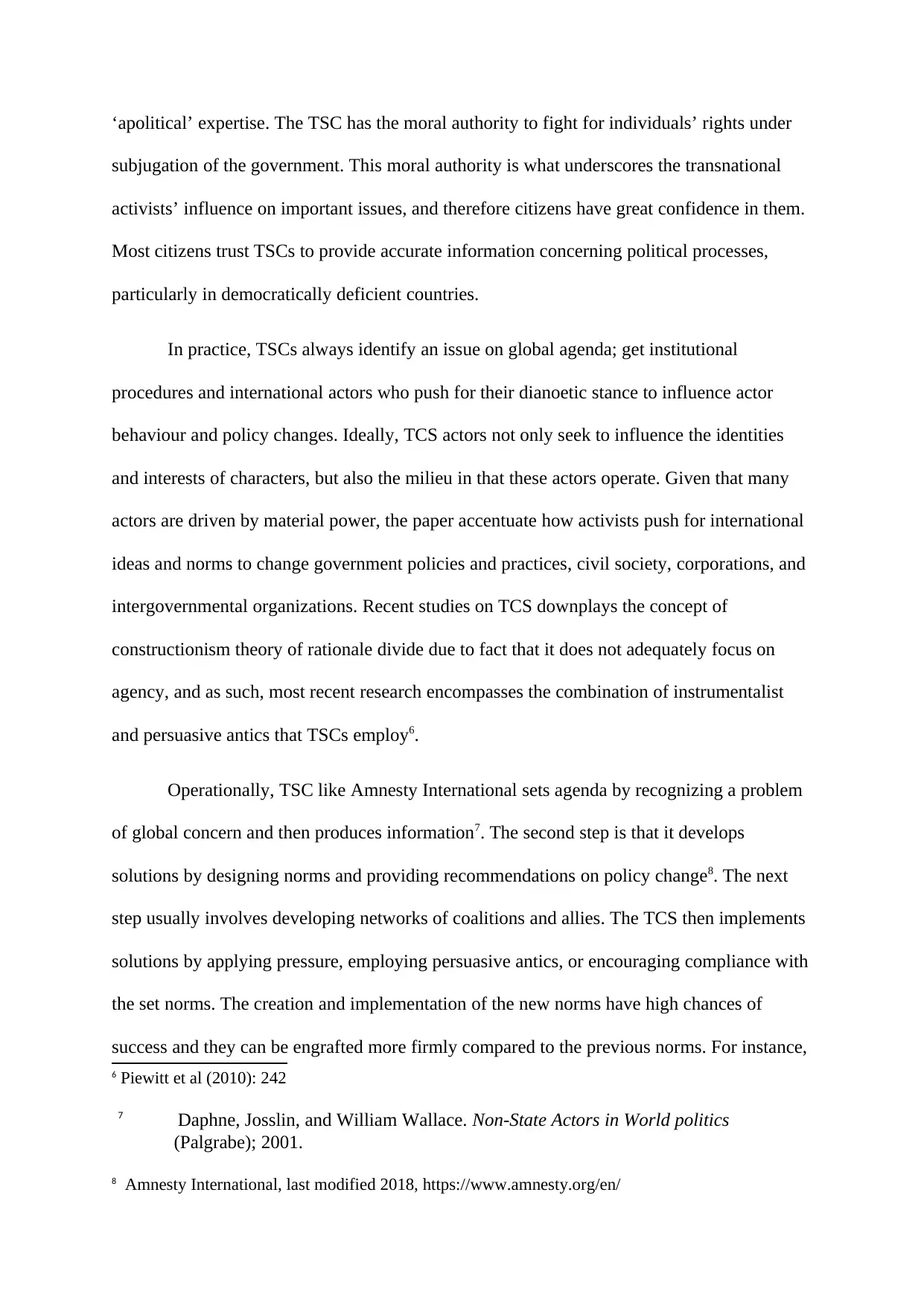
‘apolitical’ expertise. The TSC has the moral authority to fight for individuals’ rights under
subjugation of the government. This moral authority is what underscores the transnational
activists’ influence on important issues, and therefore citizens have great confidence in them.
Most citizens trust TSCs to provide accurate information concerning political processes,
particularly in democratically deficient countries.
In practice, TSCs always identify an issue on global agenda; get institutional
procedures and international actors who push for their dianoetic stance to influence actor
behaviour and policy changes. Ideally, TCS actors not only seek to influence the identities
and interests of characters, but also the milieu in that these actors operate. Given that many
actors are driven by material power, the paper accentuate how activists push for international
ideas and norms to change government policies and practices, civil society, corporations, and
intergovernmental organizations. Recent studies on TCS downplays the concept of
constructionism theory of rationale divide due to fact that it does not adequately focus on
agency, and as such, most recent research encompasses the combination of instrumentalist
and persuasive antics that TSCs employ6.
Operationally, TSC like Amnesty International sets agenda by recognizing a problem
of global concern and then produces information7. The second step is that it develops
solutions by designing norms and providing recommendations on policy change8. The next
step usually involves developing networks of coalitions and allies. The TCS then implements
solutions by applying pressure, employing persuasive antics, or encouraging compliance with
the set norms. The creation and implementation of the new norms have high chances of
success and they can be engrafted more firmly compared to the previous norms. For instance,
6 Piewitt et al (2010): 242
7 Daphne, Josslin, and William Wallace. Non-State Actors in World politics
(Palgrabe); 2001.
8 Amnesty International, last modified 2018, https://www.amnesty.org/en/
subjugation of the government. This moral authority is what underscores the transnational
activists’ influence on important issues, and therefore citizens have great confidence in them.
Most citizens trust TSCs to provide accurate information concerning political processes,
particularly in democratically deficient countries.
In practice, TSCs always identify an issue on global agenda; get institutional
procedures and international actors who push for their dianoetic stance to influence actor
behaviour and policy changes. Ideally, TCS actors not only seek to influence the identities
and interests of characters, but also the milieu in that these actors operate. Given that many
actors are driven by material power, the paper accentuate how activists push for international
ideas and norms to change government policies and practices, civil society, corporations, and
intergovernmental organizations. Recent studies on TCS downplays the concept of
constructionism theory of rationale divide due to fact that it does not adequately focus on
agency, and as such, most recent research encompasses the combination of instrumentalist
and persuasive antics that TSCs employ6.
Operationally, TSC like Amnesty International sets agenda by recognizing a problem
of global concern and then produces information7. The second step is that it develops
solutions by designing norms and providing recommendations on policy change8. The next
step usually involves developing networks of coalitions and allies. The TCS then implements
solutions by applying pressure, employing persuasive antics, or encouraging compliance with
the set norms. The creation and implementation of the new norms have high chances of
success and they can be engrafted more firmly compared to the previous norms. For instance,
6 Piewitt et al (2010): 242
7 Daphne, Josslin, and William Wallace. Non-State Actors in World politics
(Palgrabe); 2001.
8 Amnesty International, last modified 2018, https://www.amnesty.org/en/
⊘ This is a preview!⊘
Do you want full access?
Subscribe today to unlock all pages.

Trusted by 1+ million students worldwide
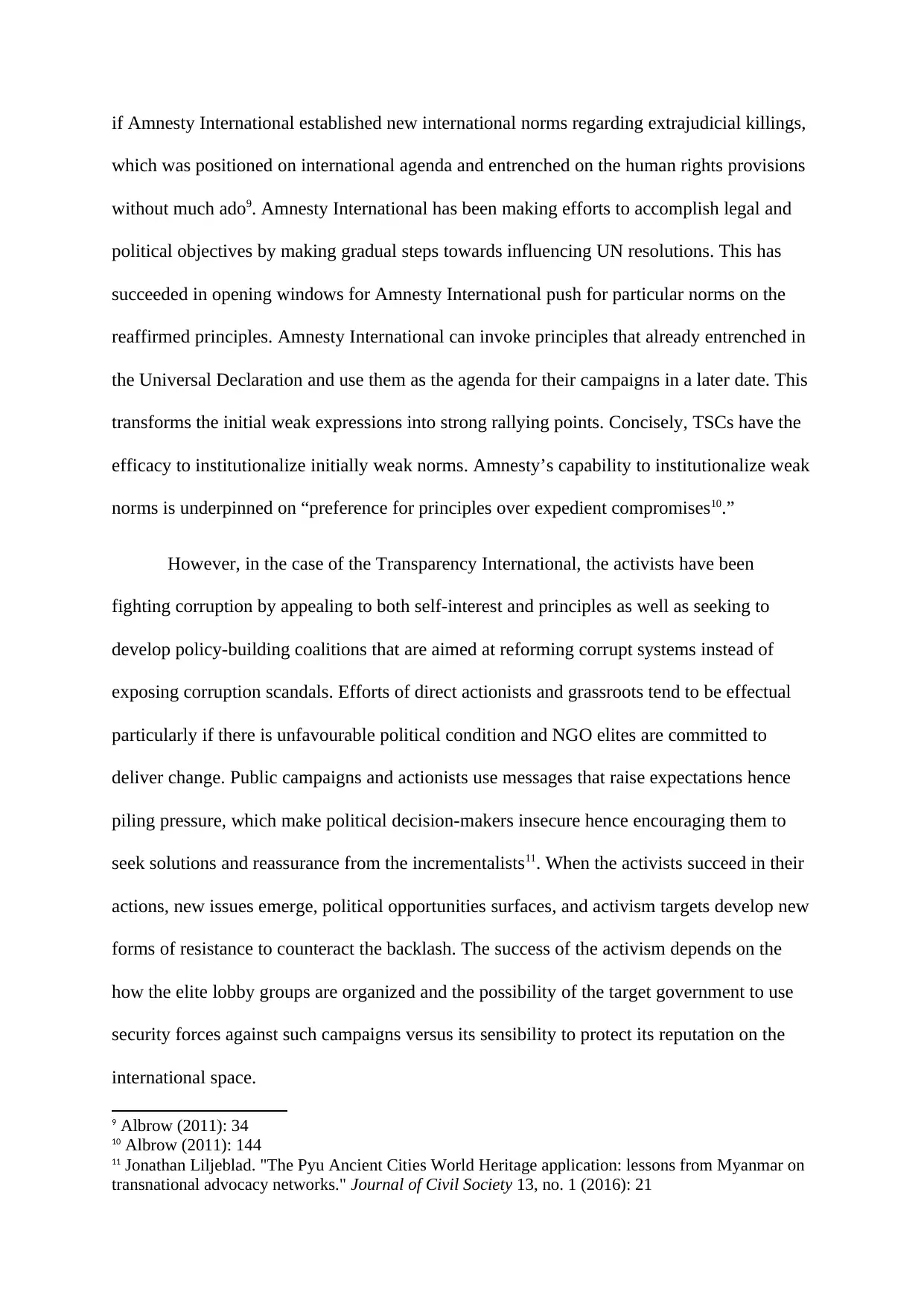
if Amnesty International established new international norms regarding extrajudicial killings,
which was positioned on international agenda and entrenched on the human rights provisions
without much ado9. Amnesty International has been making efforts to accomplish legal and
political objectives by making gradual steps towards influencing UN resolutions. This has
succeeded in opening windows for Amnesty International push for particular norms on the
reaffirmed principles. Amnesty International can invoke principles that already entrenched in
the Universal Declaration and use them as the agenda for their campaigns in a later date. This
transforms the initial weak expressions into strong rallying points. Concisely, TSCs have the
efficacy to institutionalize initially weak norms. Amnesty’s capability to institutionalize weak
norms is underpinned on “preference for principles over expedient compromises10.”
However, in the case of the Transparency International, the activists have been
fighting corruption by appealing to both self-interest and principles as well as seeking to
develop policy-building coalitions that are aimed at reforming corrupt systems instead of
exposing corruption scandals. Efforts of direct actionists and grassroots tend to be effectual
particularly if there is unfavourable political condition and NGO elites are committed to
deliver change. Public campaigns and actionists use messages that raise expectations hence
piling pressure, which make political decision-makers insecure hence encouraging them to
seek solutions and reassurance from the incrementalists11. When the activists succeed in their
actions, new issues emerge, political opportunities surfaces, and activism targets develop new
forms of resistance to counteract the backlash. The success of the activism depends on the
how the elite lobby groups are organized and the possibility of the target government to use
security forces against such campaigns versus its sensibility to protect its reputation on the
international space.
9 Albrow (2011): 34
10 Albrow (2011): 144
11 Jonathan Liljeblad. "The Pyu Ancient Cities World Heritage application: lessons from Myanmar on
transnational advocacy networks." Journal of Civil Society 13, no. 1 (2016): 21
which was positioned on international agenda and entrenched on the human rights provisions
without much ado9. Amnesty International has been making efforts to accomplish legal and
political objectives by making gradual steps towards influencing UN resolutions. This has
succeeded in opening windows for Amnesty International push for particular norms on the
reaffirmed principles. Amnesty International can invoke principles that already entrenched in
the Universal Declaration and use them as the agenda for their campaigns in a later date. This
transforms the initial weak expressions into strong rallying points. Concisely, TSCs have the
efficacy to institutionalize initially weak norms. Amnesty’s capability to institutionalize weak
norms is underpinned on “preference for principles over expedient compromises10.”
However, in the case of the Transparency International, the activists have been
fighting corruption by appealing to both self-interest and principles as well as seeking to
develop policy-building coalitions that are aimed at reforming corrupt systems instead of
exposing corruption scandals. Efforts of direct actionists and grassroots tend to be effectual
particularly if there is unfavourable political condition and NGO elites are committed to
deliver change. Public campaigns and actionists use messages that raise expectations hence
piling pressure, which make political decision-makers insecure hence encouraging them to
seek solutions and reassurance from the incrementalists11. When the activists succeed in their
actions, new issues emerge, political opportunities surfaces, and activism targets develop new
forms of resistance to counteract the backlash. The success of the activism depends on the
how the elite lobby groups are organized and the possibility of the target government to use
security forces against such campaigns versus its sensibility to protect its reputation on the
international space.
9 Albrow (2011): 34
10 Albrow (2011): 144
11 Jonathan Liljeblad. "The Pyu Ancient Cities World Heritage application: lessons from Myanmar on
transnational advocacy networks." Journal of Civil Society 13, no. 1 (2016): 21
Paraphrase This Document
Need a fresh take? Get an instant paraphrase of this document with our AI Paraphraser
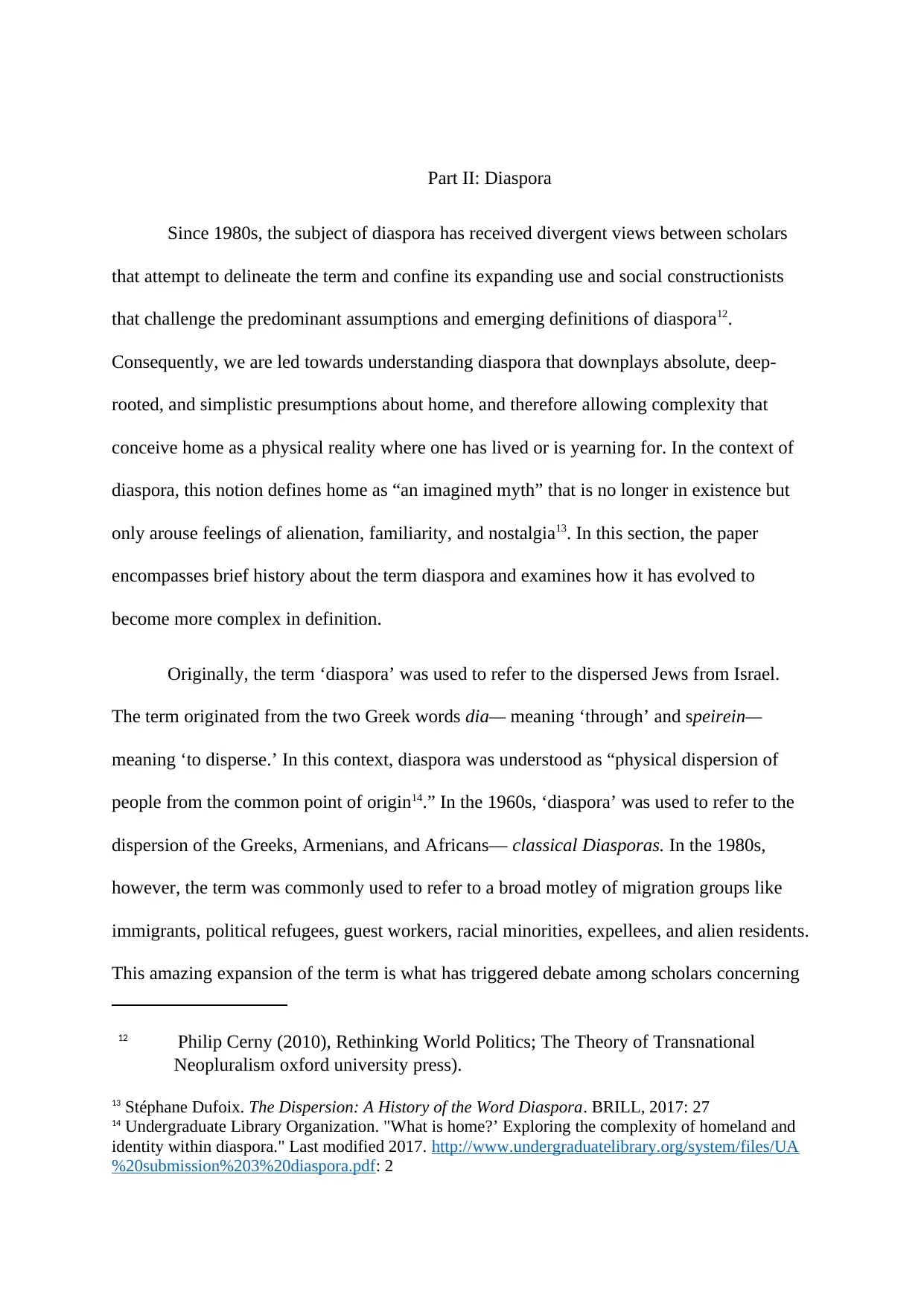
Part II: Diaspora
Since 1980s, the subject of diaspora has received divergent views between scholars
that attempt to delineate the term and confine its expanding use and social constructionists
that challenge the predominant assumptions and emerging definitions of diaspora12.
Consequently, we are led towards understanding diaspora that downplays absolute, deep-
rooted, and simplistic presumptions about home, and therefore allowing complexity that
conceive home as a physical reality where one has lived or is yearning for. In the context of
diaspora, this notion defines home as “an imagined myth” that is no longer in existence but
only arouse feelings of alienation, familiarity, and nostalgia13. In this section, the paper
encompasses brief history about the term diaspora and examines how it has evolved to
become more complex in definition.
Originally, the term ‘diaspora’ was used to refer to the dispersed Jews from Israel.
The term originated from the two Greek words dia— meaning ‘through’ and speirein—
meaning ‘to disperse.’ In this context, diaspora was understood as “physical dispersion of
people from the common point of origin14.” In the 1960s, ‘diaspora’ was used to refer to the
dispersion of the Greeks, Armenians, and Africans— classical Diasporas. In the 1980s,
however, the term was commonly used to refer to a broad motley of migration groups like
immigrants, political refugees, guest workers, racial minorities, expellees, and alien residents.
This amazing expansion of the term is what has triggered debate among scholars concerning
12 Philip Cerny (2010), Rethinking World Politics; The Theory of Transnational
Neopluralism oxford university press).
13 Stéphane Dufoix. The Dispersion: A History of the Word Diaspora. BRILL, 2017: 27
14 Undergraduate Library Organization. "What is home?’ Exploring the complexity of homeland and
identity within diaspora." Last modified 2017. http://www.undergraduatelibrary.org/system/files/UA
%20submission%203%20diaspora.pdf: 2
Since 1980s, the subject of diaspora has received divergent views between scholars
that attempt to delineate the term and confine its expanding use and social constructionists
that challenge the predominant assumptions and emerging definitions of diaspora12.
Consequently, we are led towards understanding diaspora that downplays absolute, deep-
rooted, and simplistic presumptions about home, and therefore allowing complexity that
conceive home as a physical reality where one has lived or is yearning for. In the context of
diaspora, this notion defines home as “an imagined myth” that is no longer in existence but
only arouse feelings of alienation, familiarity, and nostalgia13. In this section, the paper
encompasses brief history about the term diaspora and examines how it has evolved to
become more complex in definition.
Originally, the term ‘diaspora’ was used to refer to the dispersed Jews from Israel.
The term originated from the two Greek words dia— meaning ‘through’ and speirein—
meaning ‘to disperse.’ In this context, diaspora was understood as “physical dispersion of
people from the common point of origin14.” In the 1960s, ‘diaspora’ was used to refer to the
dispersion of the Greeks, Armenians, and Africans— classical Diasporas. In the 1980s,
however, the term was commonly used to refer to a broad motley of migration groups like
immigrants, political refugees, guest workers, racial minorities, expellees, and alien residents.
This amazing expansion of the term is what has triggered debate among scholars concerning
12 Philip Cerny (2010), Rethinking World Politics; The Theory of Transnational
Neopluralism oxford university press).
13 Stéphane Dufoix. The Dispersion: A History of the Word Diaspora. BRILL, 2017: 27
14 Undergraduate Library Organization. "What is home?’ Exploring the complexity of homeland and
identity within diaspora." Last modified 2017. http://www.undergraduatelibrary.org/system/files/UA
%20submission%203%20diaspora.pdf: 2
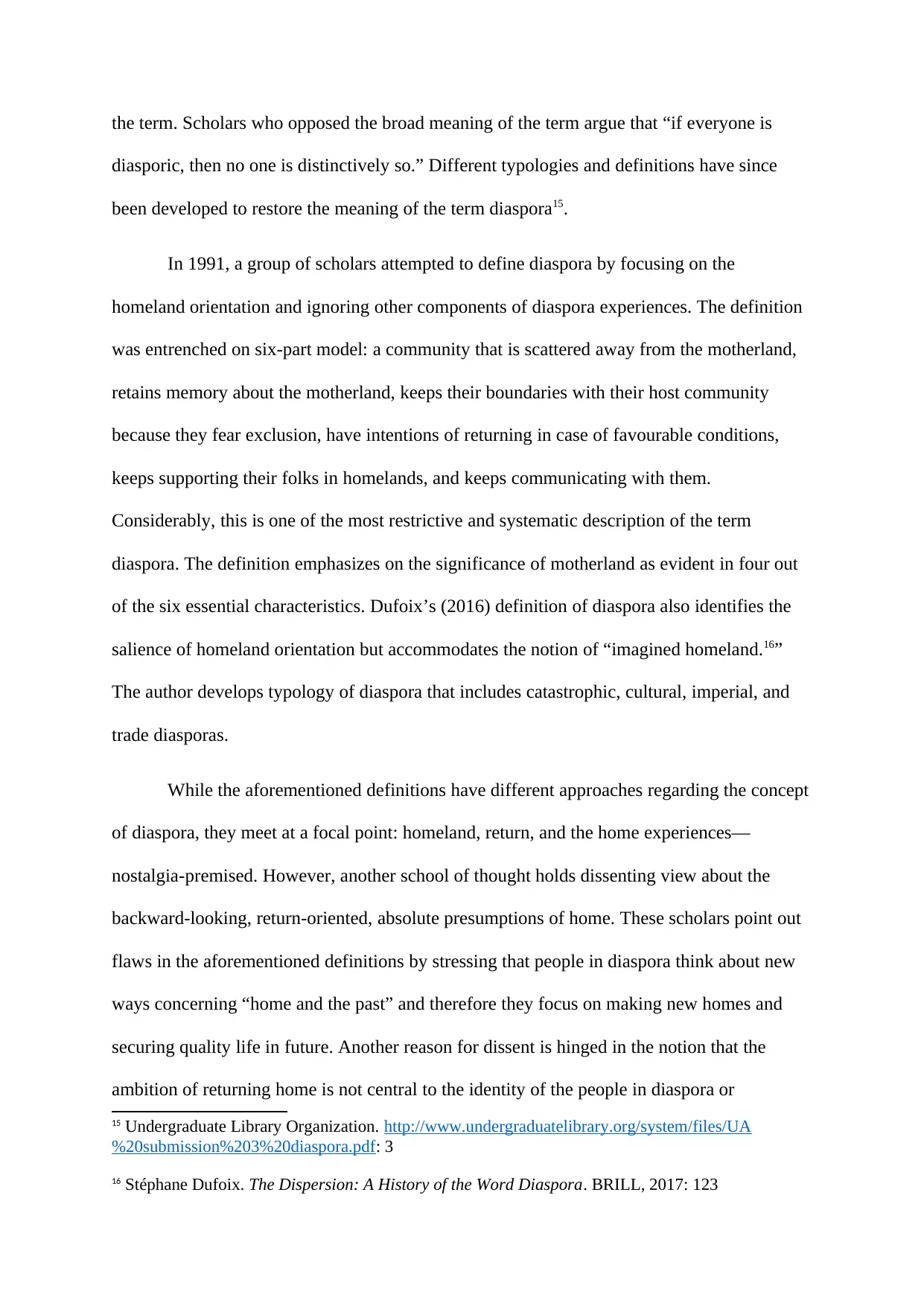
the term. Scholars who opposed the broad meaning of the term argue that “if everyone is
diasporic, then no one is distinctively so.” Different typologies and definitions have since
been developed to restore the meaning of the term diaspora15.
In 1991, a group of scholars attempted to define diaspora by focusing on the
homeland orientation and ignoring other components of diaspora experiences. The definition
was entrenched on six-part model: a community that is scattered away from the motherland,
retains memory about the motherland, keeps their boundaries with their host community
because they fear exclusion, have intentions of returning in case of favourable conditions,
keeps supporting their folks in homelands, and keeps communicating with them.
Considerably, this is one of the most restrictive and systematic description of the term
diaspora. The definition emphasizes on the significance of motherland as evident in four out
of the six essential characteristics. Dufoix’s (2016) definition of diaspora also identifies the
salience of homeland orientation but accommodates the notion of “imagined homeland.16”
The author develops typology of diaspora that includes catastrophic, cultural, imperial, and
trade diasporas.
While the aforementioned definitions have different approaches regarding the concept
of diaspora, they meet at a focal point: homeland, return, and the home experiences—
nostalgia-premised. However, another school of thought holds dissenting view about the
backward-looking, return-oriented, absolute presumptions of home. These scholars point out
flaws in the aforementioned definitions by stressing that people in diaspora think about new
ways concerning “home and the past” and therefore they focus on making new homes and
securing quality life in future. Another reason for dissent is hinged in the notion that the
ambition of returning home is not central to the identity of the people in diaspora or
15 Undergraduate Library Organization. http://www.undergraduatelibrary.org/system/files/UA
%20submission%203%20diaspora.pdf: 3
16 Stéphane Dufoix. The Dispersion: A History of the Word Diaspora. BRILL, 2017: 123
diasporic, then no one is distinctively so.” Different typologies and definitions have since
been developed to restore the meaning of the term diaspora15.
In 1991, a group of scholars attempted to define diaspora by focusing on the
homeland orientation and ignoring other components of diaspora experiences. The definition
was entrenched on six-part model: a community that is scattered away from the motherland,
retains memory about the motherland, keeps their boundaries with their host community
because they fear exclusion, have intentions of returning in case of favourable conditions,
keeps supporting their folks in homelands, and keeps communicating with them.
Considerably, this is one of the most restrictive and systematic description of the term
diaspora. The definition emphasizes on the significance of motherland as evident in four out
of the six essential characteristics. Dufoix’s (2016) definition of diaspora also identifies the
salience of homeland orientation but accommodates the notion of “imagined homeland.16”
The author develops typology of diaspora that includes catastrophic, cultural, imperial, and
trade diasporas.
While the aforementioned definitions have different approaches regarding the concept
of diaspora, they meet at a focal point: homeland, return, and the home experiences—
nostalgia-premised. However, another school of thought holds dissenting view about the
backward-looking, return-oriented, absolute presumptions of home. These scholars point out
flaws in the aforementioned definitions by stressing that people in diaspora think about new
ways concerning “home and the past” and therefore they focus on making new homes and
securing quality life in future. Another reason for dissent is hinged in the notion that the
ambition of returning home is not central to the identity of the people in diaspora or
15 Undergraduate Library Organization. http://www.undergraduatelibrary.org/system/files/UA
%20submission%203%20diaspora.pdf: 3
16 Stéphane Dufoix. The Dispersion: A History of the Word Diaspora. BRILL, 2017: 123
⊘ This is a preview!⊘
Do you want full access?
Subscribe today to unlock all pages.

Trusted by 1+ million students worldwide
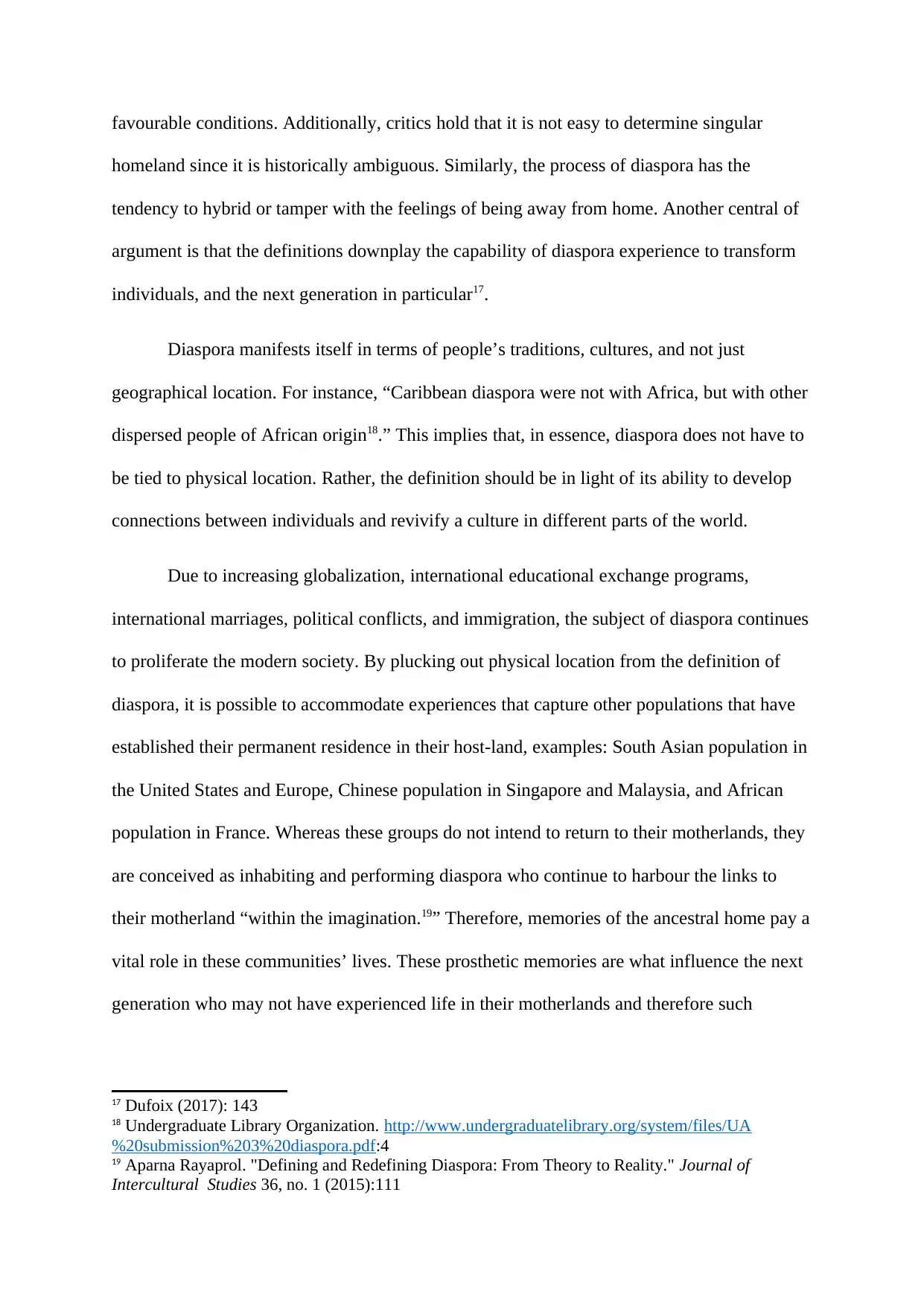
favourable conditions. Additionally, critics hold that it is not easy to determine singular
homeland since it is historically ambiguous. Similarly, the process of diaspora has the
tendency to hybrid or tamper with the feelings of being away from home. Another central of
argument is that the definitions downplay the capability of diaspora experience to transform
individuals, and the next generation in particular17.
Diaspora manifests itself in terms of people’s traditions, cultures, and not just
geographical location. For instance, “Caribbean diaspora were not with Africa, but with other
dispersed people of African origin18.” This implies that, in essence, diaspora does not have to
be tied to physical location. Rather, the definition should be in light of its ability to develop
connections between individuals and revivify a culture in different parts of the world.
Due to increasing globalization, international educational exchange programs,
international marriages, political conflicts, and immigration, the subject of diaspora continues
to proliferate the modern society. By plucking out physical location from the definition of
diaspora, it is possible to accommodate experiences that capture other populations that have
established their permanent residence in their host-land, examples: South Asian population in
the United States and Europe, Chinese population in Singapore and Malaysia, and African
population in France. Whereas these groups do not intend to return to their motherlands, they
are conceived as inhabiting and performing diaspora who continue to harbour the links to
their motherland “within the imagination.19” Therefore, memories of the ancestral home pay a
vital role in these communities’ lives. These prosthetic memories are what influence the next
generation who may not have experienced life in their motherlands and therefore such
17 Dufoix (2017): 143
18 Undergraduate Library Organization. http://www.undergraduatelibrary.org/system/files/UA
%20submission%203%20diaspora.pdf:4
19 Aparna Rayaprol. "Defining and Redefining Diaspora: From Theory to Reality." Journal of
Intercultural Studies 36, no. 1 (2015):111
homeland since it is historically ambiguous. Similarly, the process of diaspora has the
tendency to hybrid or tamper with the feelings of being away from home. Another central of
argument is that the definitions downplay the capability of diaspora experience to transform
individuals, and the next generation in particular17.
Diaspora manifests itself in terms of people’s traditions, cultures, and not just
geographical location. For instance, “Caribbean diaspora were not with Africa, but with other
dispersed people of African origin18.” This implies that, in essence, diaspora does not have to
be tied to physical location. Rather, the definition should be in light of its ability to develop
connections between individuals and revivify a culture in different parts of the world.
Due to increasing globalization, international educational exchange programs,
international marriages, political conflicts, and immigration, the subject of diaspora continues
to proliferate the modern society. By plucking out physical location from the definition of
diaspora, it is possible to accommodate experiences that capture other populations that have
established their permanent residence in their host-land, examples: South Asian population in
the United States and Europe, Chinese population in Singapore and Malaysia, and African
population in France. Whereas these groups do not intend to return to their motherlands, they
are conceived as inhabiting and performing diaspora who continue to harbour the links to
their motherland “within the imagination.19” Therefore, memories of the ancestral home pay a
vital role in these communities’ lives. These prosthetic memories are what influence the next
generation who may not have experienced life in their motherlands and therefore such
17 Dufoix (2017): 143
18 Undergraduate Library Organization. http://www.undergraduatelibrary.org/system/files/UA
%20submission%203%20diaspora.pdf:4
19 Aparna Rayaprol. "Defining and Redefining Diaspora: From Theory to Reality." Journal of
Intercultural Studies 36, no. 1 (2015):111
Paraphrase This Document
Need a fresh take? Get an instant paraphrase of this document with our AI Paraphraser
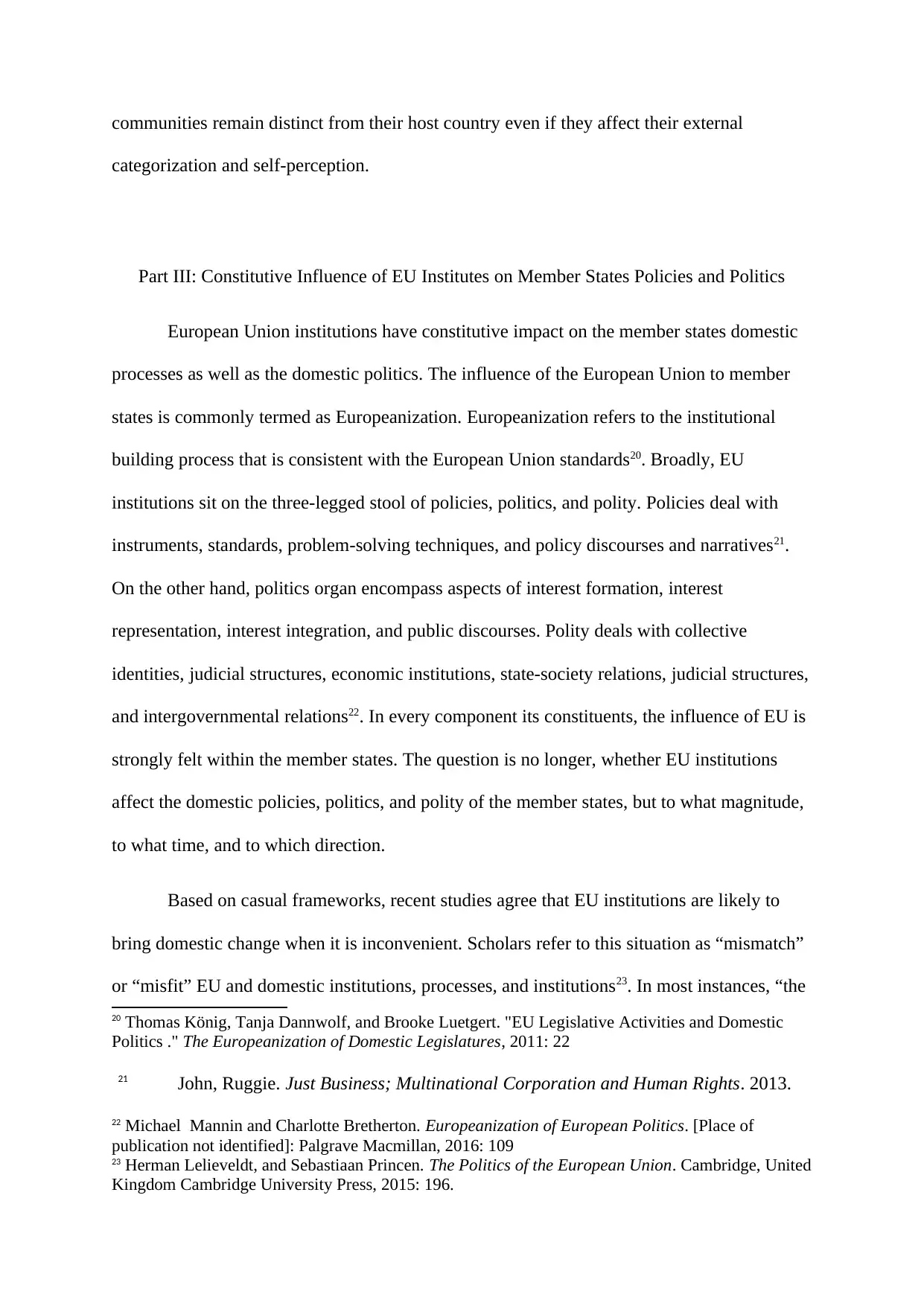
communities remain distinct from their host country even if they affect their external
categorization and self-perception.
Part III: Constitutive Influence of EU Institutes on Member States Policies and Politics
European Union institutions have constitutive impact on the member states domestic
processes as well as the domestic politics. The influence of the European Union to member
states is commonly termed as Europeanization. Europeanization refers to the institutional
building process that is consistent with the European Union standards20. Broadly, EU
institutions sit on the three-legged stool of policies, politics, and polity. Policies deal with
instruments, standards, problem-solving techniques, and policy discourses and narratives21.
On the other hand, politics organ encompass aspects of interest formation, interest
representation, interest integration, and public discourses. Polity deals with collective
identities, judicial structures, economic institutions, state-society relations, judicial structures,
and intergovernmental relations22. In every component its constituents, the influence of EU is
strongly felt within the member states. The question is no longer, whether EU institutions
affect the domestic policies, politics, and polity of the member states, but to what magnitude,
to what time, and to which direction.
Based on casual frameworks, recent studies agree that EU institutions are likely to
bring domestic change when it is inconvenient. Scholars refer to this situation as “mismatch”
or “misfit” EU and domestic institutions, processes, and institutions23. In most instances, “the
20 Thomas König, Tanja Dannwolf, and Brooke Luetgert. "EU Legislative Activities and Domestic
Politics ." The Europeanization of Domestic Legislatures, 2011: 22
21 John, Ruggie. Just Business; Multinational Corporation and Human Rights. 2013.
22 Michael Mannin and Charlotte Bretherton. Europeanization of European Politics. [Place of
publication not identified]: Palgrave Macmillan, 2016: 109
23 Herman Lelieveldt, and Sebastiaan Princen. The Politics of the European Union. Cambridge, United
Kingdom Cambridge University Press, 2015: 196.
categorization and self-perception.
Part III: Constitutive Influence of EU Institutes on Member States Policies and Politics
European Union institutions have constitutive impact on the member states domestic
processes as well as the domestic politics. The influence of the European Union to member
states is commonly termed as Europeanization. Europeanization refers to the institutional
building process that is consistent with the European Union standards20. Broadly, EU
institutions sit on the three-legged stool of policies, politics, and polity. Policies deal with
instruments, standards, problem-solving techniques, and policy discourses and narratives21.
On the other hand, politics organ encompass aspects of interest formation, interest
representation, interest integration, and public discourses. Polity deals with collective
identities, judicial structures, economic institutions, state-society relations, judicial structures,
and intergovernmental relations22. In every component its constituents, the influence of EU is
strongly felt within the member states. The question is no longer, whether EU institutions
affect the domestic policies, politics, and polity of the member states, but to what magnitude,
to what time, and to which direction.
Based on casual frameworks, recent studies agree that EU institutions are likely to
bring domestic change when it is inconvenient. Scholars refer to this situation as “mismatch”
or “misfit” EU and domestic institutions, processes, and institutions23. In most instances, “the
20 Thomas König, Tanja Dannwolf, and Brooke Luetgert. "EU Legislative Activities and Domestic
Politics ." The Europeanization of Domestic Legislatures, 2011: 22
21 John, Ruggie. Just Business; Multinational Corporation and Human Rights. 2013.
22 Michael Mannin and Charlotte Bretherton. Europeanization of European Politics. [Place of
publication not identified]: Palgrave Macmillan, 2016: 109
23 Herman Lelieveldt, and Sebastiaan Princen. The Politics of the European Union. Cambridge, United
Kingdom Cambridge University Press, 2015: 196.
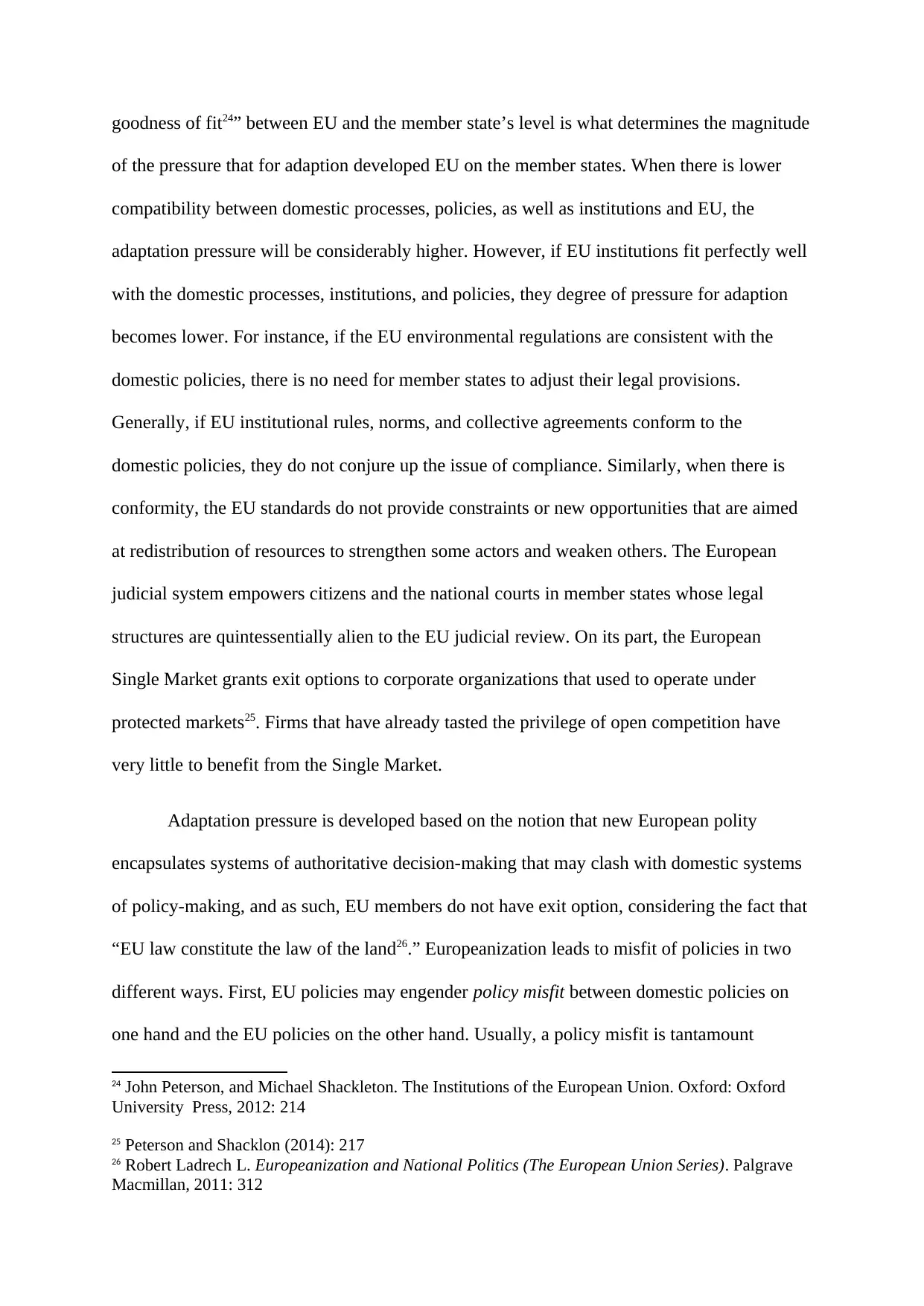
goodness of fit24” between EU and the member state’s level is what determines the magnitude
of the pressure that for adaption developed EU on the member states. When there is lower
compatibility between domestic processes, policies, as well as institutions and EU, the
adaptation pressure will be considerably higher. However, if EU institutions fit perfectly well
with the domestic processes, institutions, and policies, they degree of pressure for adaption
becomes lower. For instance, if the EU environmental regulations are consistent with the
domestic policies, there is no need for member states to adjust their legal provisions.
Generally, if EU institutional rules, norms, and collective agreements conform to the
domestic policies, they do not conjure up the issue of compliance. Similarly, when there is
conformity, the EU standards do not provide constraints or new opportunities that are aimed
at redistribution of resources to strengthen some actors and weaken others. The European
judicial system empowers citizens and the national courts in member states whose legal
structures are quintessentially alien to the EU judicial review. On its part, the European
Single Market grants exit options to corporate organizations that used to operate under
protected markets25. Firms that have already tasted the privilege of open competition have
very little to benefit from the Single Market.
Adaptation pressure is developed based on the notion that new European polity
encapsulates systems of authoritative decision-making that may clash with domestic systems
of policy-making, and as such, EU members do not have exit option, considering the fact that
“EU law constitute the law of the land26.” Europeanization leads to misfit of policies in two
different ways. First, EU policies may engender policy misfit between domestic policies on
one hand and the EU policies on the other hand. Usually, a policy misfit is tantamount
24 John Peterson, and Michael Shackleton. The Institutions of the European Union. Oxford: Oxford
University Press, 2012: 214
25 Peterson and Shacklon (2014): 217
26 Robert Ladrech L. Europeanization and National Politics (The European Union Series). Palgrave
Macmillan, 2011: 312
of the pressure that for adaption developed EU on the member states. When there is lower
compatibility between domestic processes, policies, as well as institutions and EU, the
adaptation pressure will be considerably higher. However, if EU institutions fit perfectly well
with the domestic processes, institutions, and policies, they degree of pressure for adaption
becomes lower. For instance, if the EU environmental regulations are consistent with the
domestic policies, there is no need for member states to adjust their legal provisions.
Generally, if EU institutional rules, norms, and collective agreements conform to the
domestic policies, they do not conjure up the issue of compliance. Similarly, when there is
conformity, the EU standards do not provide constraints or new opportunities that are aimed
at redistribution of resources to strengthen some actors and weaken others. The European
judicial system empowers citizens and the national courts in member states whose legal
structures are quintessentially alien to the EU judicial review. On its part, the European
Single Market grants exit options to corporate organizations that used to operate under
protected markets25. Firms that have already tasted the privilege of open competition have
very little to benefit from the Single Market.
Adaptation pressure is developed based on the notion that new European polity
encapsulates systems of authoritative decision-making that may clash with domestic systems
of policy-making, and as such, EU members do not have exit option, considering the fact that
“EU law constitute the law of the land26.” Europeanization leads to misfit of policies in two
different ways. First, EU policies may engender policy misfit between domestic policies on
one hand and the EU policies on the other hand. Usually, a policy misfit is tantamount
24 John Peterson, and Michael Shackleton. The Institutions of the European Union. Oxford: Oxford
University Press, 2012: 214
25 Peterson and Shacklon (2014): 217
26 Robert Ladrech L. Europeanization and National Politics (The European Union Series). Palgrave
Macmillan, 2011: 312
⊘ This is a preview!⊘
Do you want full access?
Subscribe today to unlock all pages.

Trusted by 1+ million students worldwide
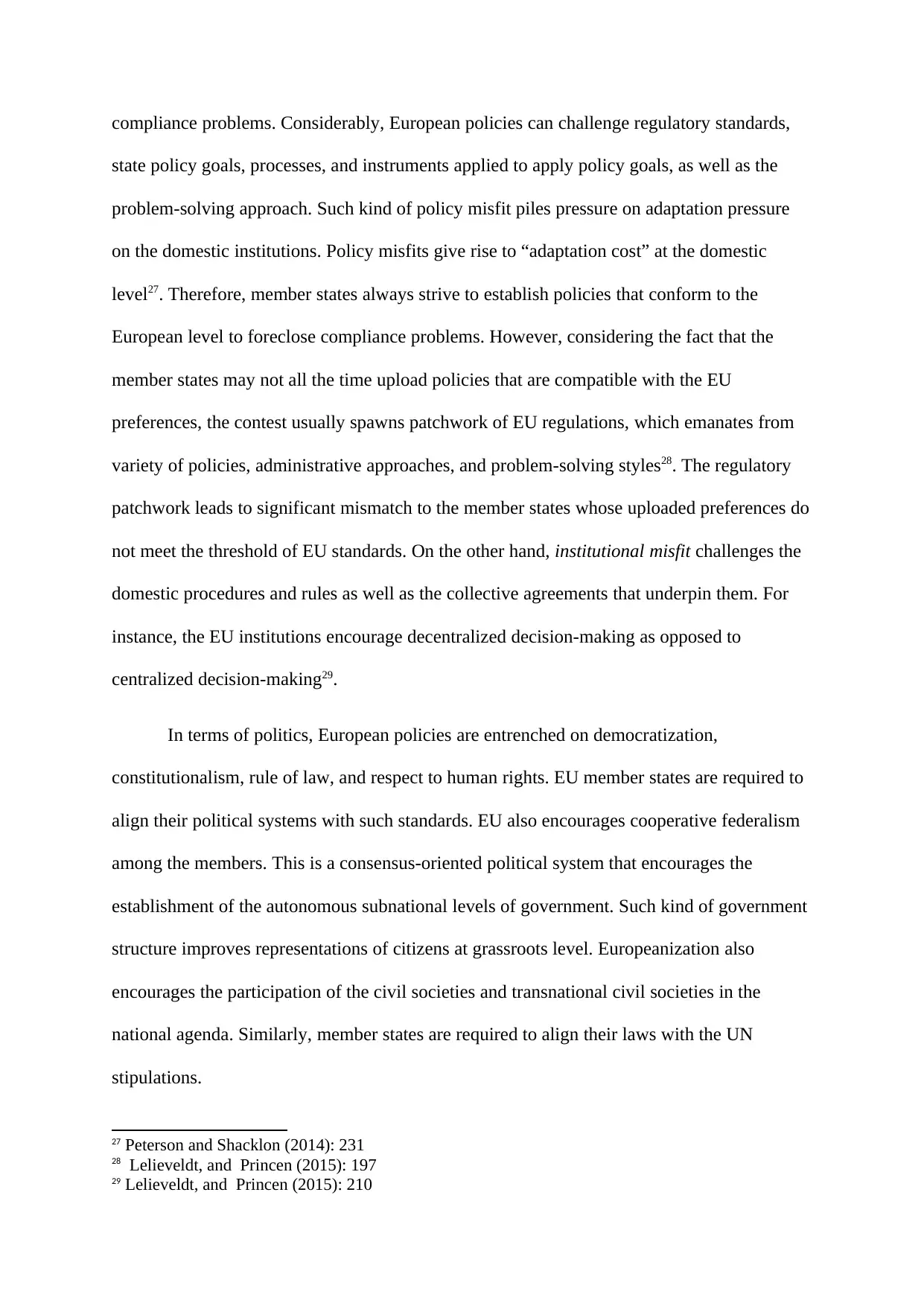
compliance problems. Considerably, European policies can challenge regulatory standards,
state policy goals, processes, and instruments applied to apply policy goals, as well as the
problem-solving approach. Such kind of policy misfit piles pressure on adaptation pressure
on the domestic institutions. Policy misfits give rise to “adaptation cost” at the domestic
level27. Therefore, member states always strive to establish policies that conform to the
European level to foreclose compliance problems. However, considering the fact that the
member states may not all the time upload policies that are compatible with the EU
preferences, the contest usually spawns patchwork of EU regulations, which emanates from
variety of policies, administrative approaches, and problem-solving styles28. The regulatory
patchwork leads to significant mismatch to the member states whose uploaded preferences do
not meet the threshold of EU standards. On the other hand, institutional misfit challenges the
domestic procedures and rules as well as the collective agreements that underpin them. For
instance, the EU institutions encourage decentralized decision-making as opposed to
centralized decision-making29.
In terms of politics, European policies are entrenched on democratization,
constitutionalism, rule of law, and respect to human rights. EU member states are required to
align their political systems with such standards. EU also encourages cooperative federalism
among the members. This is a consensus-oriented political system that encourages the
establishment of the autonomous subnational levels of government. Such kind of government
structure improves representations of citizens at grassroots level. Europeanization also
encourages the participation of the civil societies and transnational civil societies in the
national agenda. Similarly, member states are required to align their laws with the UN
stipulations.
27 Peterson and Shacklon (2014): 231
28 Lelieveldt, and Princen (2015): 197
29 Lelieveldt, and Princen (2015): 210
state policy goals, processes, and instruments applied to apply policy goals, as well as the
problem-solving approach. Such kind of policy misfit piles pressure on adaptation pressure
on the domestic institutions. Policy misfits give rise to “adaptation cost” at the domestic
level27. Therefore, member states always strive to establish policies that conform to the
European level to foreclose compliance problems. However, considering the fact that the
member states may not all the time upload policies that are compatible with the EU
preferences, the contest usually spawns patchwork of EU regulations, which emanates from
variety of policies, administrative approaches, and problem-solving styles28. The regulatory
patchwork leads to significant mismatch to the member states whose uploaded preferences do
not meet the threshold of EU standards. On the other hand, institutional misfit challenges the
domestic procedures and rules as well as the collective agreements that underpin them. For
instance, the EU institutions encourage decentralized decision-making as opposed to
centralized decision-making29.
In terms of politics, European policies are entrenched on democratization,
constitutionalism, rule of law, and respect to human rights. EU member states are required to
align their political systems with such standards. EU also encourages cooperative federalism
among the members. This is a consensus-oriented political system that encourages the
establishment of the autonomous subnational levels of government. Such kind of government
structure improves representations of citizens at grassroots level. Europeanization also
encourages the participation of the civil societies and transnational civil societies in the
national agenda. Similarly, member states are required to align their laws with the UN
stipulations.
27 Peterson and Shacklon (2014): 231
28 Lelieveldt, and Princen (2015): 197
29 Lelieveldt, and Princen (2015): 210
Paraphrase This Document
Need a fresh take? Get an instant paraphrase of this document with our AI Paraphraser
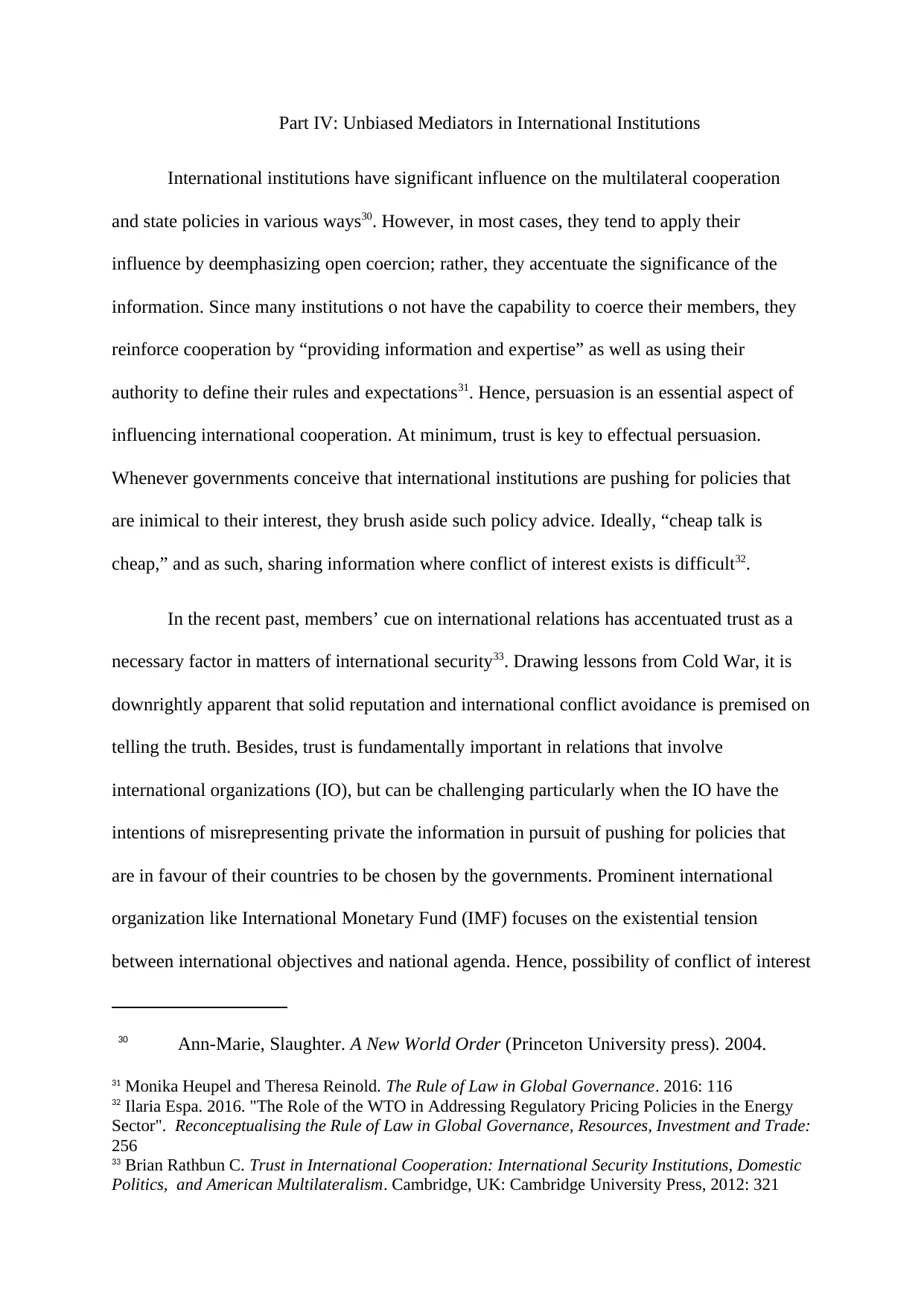
Part IV: Unbiased Mediators in International Institutions
International institutions have significant influence on the multilateral cooperation
and state policies in various ways30. However, in most cases, they tend to apply their
influence by deemphasizing open coercion; rather, they accentuate the significance of the
information. Since many institutions o not have the capability to coerce their members, they
reinforce cooperation by “providing information and expertise” as well as using their
authority to define their rules and expectations31. Hence, persuasion is an essential aspect of
influencing international cooperation. At minimum, trust is key to effectual persuasion.
Whenever governments conceive that international institutions are pushing for policies that
are inimical to their interest, they brush aside such policy advice. Ideally, “cheap talk is
cheap,” and as such, sharing information where conflict of interest exists is difficult32.
In the recent past, members’ cue on international relations has accentuated trust as a
necessary factor in matters of international security33. Drawing lessons from Cold War, it is
downrightly apparent that solid reputation and international conflict avoidance is premised on
telling the truth. Besides, trust is fundamentally important in relations that involve
international organizations (IO), but can be challenging particularly when the IO have the
intentions of misrepresenting private the information in pursuit of pushing for policies that
are in favour of their countries to be chosen by the governments. Prominent international
organization like International Monetary Fund (IMF) focuses on the existential tension
between international objectives and national agenda. Hence, possibility of conflict of interest
30 Ann-Marie, Slaughter. A New World Order (Princeton University press). 2004.
31 Monika Heupel and Theresa Reinold. The Rule of Law in Global Governance. 2016: 116
32 Ilaria Espa. 2016. "The Role of the WTO in Addressing Regulatory Pricing Policies in the Energy
Sector". Reconceptualising the Rule of Law in Global Governance, Resources, Investment and Trade:
256
33 Brian Rathbun C. Trust in International Cooperation: International Security Institutions, Domestic
Politics, and American Multilateralism. Cambridge, UK: Cambridge University Press, 2012: 321
International institutions have significant influence on the multilateral cooperation
and state policies in various ways30. However, in most cases, they tend to apply their
influence by deemphasizing open coercion; rather, they accentuate the significance of the
information. Since many institutions o not have the capability to coerce their members, they
reinforce cooperation by “providing information and expertise” as well as using their
authority to define their rules and expectations31. Hence, persuasion is an essential aspect of
influencing international cooperation. At minimum, trust is key to effectual persuasion.
Whenever governments conceive that international institutions are pushing for policies that
are inimical to their interest, they brush aside such policy advice. Ideally, “cheap talk is
cheap,” and as such, sharing information where conflict of interest exists is difficult32.
In the recent past, members’ cue on international relations has accentuated trust as a
necessary factor in matters of international security33. Drawing lessons from Cold War, it is
downrightly apparent that solid reputation and international conflict avoidance is premised on
telling the truth. Besides, trust is fundamentally important in relations that involve
international organizations (IO), but can be challenging particularly when the IO have the
intentions of misrepresenting private the information in pursuit of pushing for policies that
are in favour of their countries to be chosen by the governments. Prominent international
organization like International Monetary Fund (IMF) focuses on the existential tension
between international objectives and national agenda. Hence, possibility of conflict of interest
30 Ann-Marie, Slaughter. A New World Order (Princeton University press). 2004.
31 Monika Heupel and Theresa Reinold. The Rule of Law in Global Governance. 2016: 116
32 Ilaria Espa. 2016. "The Role of the WTO in Addressing Regulatory Pricing Policies in the Energy
Sector". Reconceptualising the Rule of Law in Global Governance, Resources, Investment and Trade:
256
33 Brian Rathbun C. Trust in International Cooperation: International Security Institutions, Domestic
Politics, and American Multilateralism. Cambridge, UK: Cambridge University Press, 2012: 321
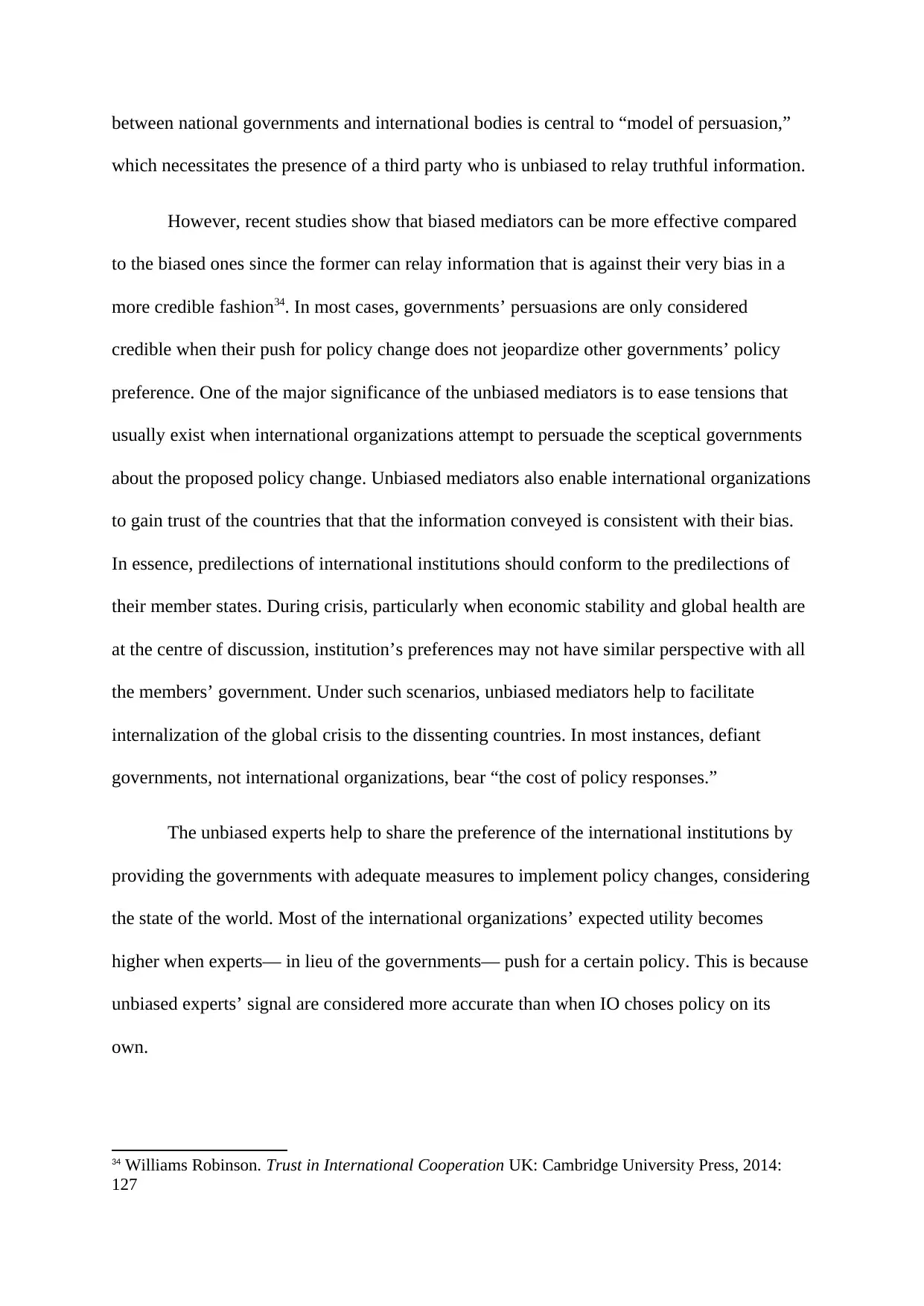
between national governments and international bodies is central to “model of persuasion,”
which necessitates the presence of a third party who is unbiased to relay truthful information.
However, recent studies show that biased mediators can be more effective compared
to the biased ones since the former can relay information that is against their very bias in a
more credible fashion34. In most cases, governments’ persuasions are only considered
credible when their push for policy change does not jeopardize other governments’ policy
preference. One of the major significance of the unbiased mediators is to ease tensions that
usually exist when international organizations attempt to persuade the sceptical governments
about the proposed policy change. Unbiased mediators also enable international organizations
to gain trust of the countries that that the information conveyed is consistent with their bias.
In essence, predilections of international institutions should conform to the predilections of
their member states. During crisis, particularly when economic stability and global health are
at the centre of discussion, institution’s preferences may not have similar perspective with all
the members’ government. Under such scenarios, unbiased mediators help to facilitate
internalization of the global crisis to the dissenting countries. In most instances, defiant
governments, not international organizations, bear “the cost of policy responses.”
The unbiased experts help to share the preference of the international institutions by
providing the governments with adequate measures to implement policy changes, considering
the state of the world. Most of the international organizations’ expected utility becomes
higher when experts— in lieu of the governments— push for a certain policy. This is because
unbiased experts’ signal are considered more accurate than when IO choses policy on its
own.
34 Williams Robinson. Trust in International Cooperation UK: Cambridge University Press, 2014:
127
which necessitates the presence of a third party who is unbiased to relay truthful information.
However, recent studies show that biased mediators can be more effective compared
to the biased ones since the former can relay information that is against their very bias in a
more credible fashion34. In most cases, governments’ persuasions are only considered
credible when their push for policy change does not jeopardize other governments’ policy
preference. One of the major significance of the unbiased mediators is to ease tensions that
usually exist when international organizations attempt to persuade the sceptical governments
about the proposed policy change. Unbiased mediators also enable international organizations
to gain trust of the countries that that the information conveyed is consistent with their bias.
In essence, predilections of international institutions should conform to the predilections of
their member states. During crisis, particularly when economic stability and global health are
at the centre of discussion, institution’s preferences may not have similar perspective with all
the members’ government. Under such scenarios, unbiased mediators help to facilitate
internalization of the global crisis to the dissenting countries. In most instances, defiant
governments, not international organizations, bear “the cost of policy responses.”
The unbiased experts help to share the preference of the international institutions by
providing the governments with adequate measures to implement policy changes, considering
the state of the world. Most of the international organizations’ expected utility becomes
higher when experts— in lieu of the governments— push for a certain policy. This is because
unbiased experts’ signal are considered more accurate than when IO choses policy on its
own.
34 Williams Robinson. Trust in International Cooperation UK: Cambridge University Press, 2014:
127
⊘ This is a preview!⊘
Do you want full access?
Subscribe today to unlock all pages.

Trusted by 1+ million students worldwide
1 out of 16
Your All-in-One AI-Powered Toolkit for Academic Success.
+13062052269
info@desklib.com
Available 24*7 on WhatsApp / Email
![[object Object]](/_next/static/media/star-bottom.7253800d.svg)
Unlock your academic potential
Copyright © 2020–2026 A2Z Services. All Rights Reserved. Developed and managed by ZUCOL.
